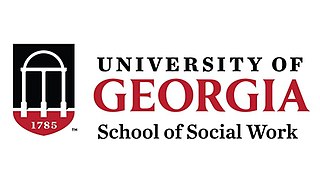
Harvard Kennedy School (HKS), officially the John F. Kennedy School of Government, is the school of public policy and government of Harvard University in Cambridge, Massachusetts. The school offers master's degrees in public policy, public administration, and international development, four doctoral degrees, and various executive education programs. It conducts research in subjects relating to politics, government, international affairs, and economics. As of 2021, HKS had an endowment of $1.7 billion. It is a member of the Association of Professional Schools of International Affairs (APSIA), a global consortium of schools that trains leaders in international affairs.
The Master of Public Policy (MPP), is one of several public policy degrees. An MPP is a master's-level professional degree that provides training in policy analysis and program evaluation at public policy schools. The MPP program places a focus on the systematic analysis of issues related to public policy and the decision processes associated with them. This includes training in the role of economic and political factors in public decision-making and policy formulation; microeconomic analysis of policy options and issues; resource allocation and decision modeling; cost/benefit analysis; statistical methods; and various applications to specific public policy topics. MPP recipients serve or have served in the public sector, at the international, national, subnational, and local levels and the private sector.

The Princeton School of Public and International Affairs is a professional public policy school at Princeton University. The school provides an array of comprehensive coursework in the fields of international development, foreign policy, science and technology, and economics and finance through its undergraduate (AB) degrees, graduate Master of Public Affairs (MPA), Master of Public Policy (MPP), and PhD degrees.
The University of Maryland Francis King Carey School of Law is the law school of the University of Maryland, Baltimore and is located in Baltimore City, Maryland, U.S. Its location places Maryland Law in the Baltimore-Washington legal and business community. Founded in 1816, it is one of the oldest law schools in the United States.
The Munk School of Global Affairs and Public Policy at the University of Toronto is an interdisciplinary academic centre. It offers various research and educational programs related to the field of globalization. It is located in Toronto, Ontario, offers master's degrees in global affairs and public policy, and a master's degree in European, Russian and Asia-Pacific studies. This school is a member of the Association of Professional Schools of International Affairs (APSIA). It also works in group of schools that educate students in international affairs. The Munk School's Master of Global Affairs program typically receives 500 and 600 applicants per year and offers 80 students entry into its program.

The Gerald R. Ford School of Public Policy, also known as the Ford School, is the public policy school of the University of Michigan in Ann Arbor, Michigan. Founded in 1914 to train municipal administration experts, the school was named after University of Michigan alumus and former U.S. President Gerald Ford in 1999.
Master of Professional Studies (MPS) is a type of master's degree concentrated in an applied field of study. MPS degrees are often interdisciplinary. While Master of Arts and Master of Science degree programs tend to focus on theory and research, Master of Professional Studies degrees tend to emphasize practical skills designed for current and aspiring professionals, including post-bachelor and post-graduate students, and often require some amount of fieldwork or internship to complement classroom learning.

The Edward J. Bloustein School of Planning and Public Policy of Rutgers University serves as a center for the theory and practice of urban planning, public policy and public health/health administration scholarship. The school is located in New Brunswick, New Jersey, and was named in honor of the former Rutgers University president, Edward J. Bloustein. Through its academic programs and research centers, the Bloustein School engages in instruction and research, combined learning and application. The school's strengths and the specializations of its faculty are vast and many of its faculty members are the founders of theories or practices that are now commonplace in urban planning and policy. Areas of expertise for Bloustein faculty members include transportation planning and the environment, urban and community health, workforce development, and social justice.

The Robert H. Smith School of Business is the business school at the University of Maryland, College Park, a public research university in College Park, Maryland. The school was named after alumnus Robert H. Smith. One of 12 colleges and schools at the university's main campus, the Smith School offers programs at both the graduate and undergraduate levels. It is accredited by the Association to Advance Collegiate Schools of Business (AACSB) to award bachelor's, master's, and doctoral degrees in business.

The University of Georgia School of Social Work (SSW) is a college within the University of Georgia (UGA) in Athens, Georgia, United States.

The Arthur Kroeger College of Public Affairs, colloquially known as Arthur Kroeger College or AKC, is a specialized institute within the Faculty of Public Affairs at Carleton University in Ottawa, Ontario. The College offers undergraduate and graduate programs in the fields of public policy, international studies, and political management. These include the Bachelor of Public Affairs and Policy Management (BPAPM), the Bachelor of Global and International Studies (BGInS), the Master of Political Management (MPM), and the MA in Migration and Diaspora Studies (MDS).
The American University School of Public Affairs (SPA) is an institution of higher education and research located in Washington, D.C. that grants academic degrees in political science, public administration, public policy, and justice, law, and criminology. Established in 1934 as part of American University, the school houses three academic departments - Public Administration & Policy, Government, and Justice, Law & Criminology - as well as ten centers and institutes.

The McCourt School of Public Policy is one of ten constituent schools of Georgetown University in Washington, D.C. The McCourt School offers master's degrees in public policy, international development policy, policy management, data science for public policy, and policy leadership as well as administers several professional certificate programs and houses fifteen affiliated research centers. The McCourt School has twenty-one full-time faculty members, ten visiting faculty members, more than one-hundred adjunct faculty members and approximately 450 enrolled students across the various degree and executive education programs.

The Frank Batten School of Leadership and Public Policy is the public policy school of the University of Virginia.

The James W. Martin School of Public Policy and Administration is the graduate school of Public Affairs at the University of Kentucky.
The College of Information Studies is a school within the University of Maryland, College Park in Maryland, United States. The College offers graduate study leading to the Master of Library and Information Science (MLIS), the Master of Information Management (MIM), the Master of Science in Human Computer Interaction (HCIM), and the Doctor of Philosophy (Ph.D.) in Information Studies. In addition, it offers an undergraduate degree, the Bachelor of Science in Information Science. The College of Information Studies focuses on creating new designs and addressing issues involving Information Management.

The Pepperdine University School of Public Policy (SPP) is a Master of Public Policy (MPP) degree program, located in Malibu, California with summer classes offered in Washington, DC. It is one of four graduate schools at Pepperdine University. The MPP is customized with specializations in Applied Economic Policy, American Policy and Politics, International Relations and National Security, State and Local Policy, and Public Policy Dispute Resolution.

The Trachtenberg School, officially the Trachtenberg School of Public Policy and Public Administration (TSPPPA), is the graduate public policy school in the Columbian College of Arts and Sciences of the George Washington University, in Washington, D.C.
The University of Maryland College of Agriculture and Natural Resources is the agricultural and environmental sciences college of the University of Maryland and operates the Maryland Sea Grant College in cooperation with the University of Maryland Center for Environmental Science and the National Oceanic and Atmospheric Administration.

The KDI School of Public Policy and Management is a government-run graduate school located in Sejong City, South Korea and is affiliated to the Korea Development Institute (KDI) and a member of the National Research Council for Economics, Humanities, and Social Sciences. The school was first established in 1997 in Dongdaemun District, Seoul, before moving to Sejong City in 2015 under the South Korean government's actions to establish the city as the de facto administrative capital of the country. The school specializes in fostering international experts in the field of development economics and public policy.















